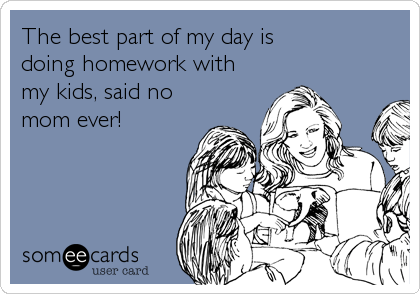
It seems like just yesterday I would come home from Elementary school and my mom would ask her notorious question, “So what do you have for homework?” The question would soon follow with my mom sitting down with me and helping with my spelling and math homework. Possibly even a little bit of reading. But, other than my homework never consisted much more than an hour or so and as a preteen I definitely didn’t mind at all. However it seems these days schools and teachers are packing on the homework in insane amounts. My niece is only six and the amount of homework and activities she has during the week astonishes me when I think back to my life has a first grader. So I guess the real question that I’m proposing is does the amount of really benefit students or do we just think it does?
The article “Kids have three times too much homework, study finds; what’s the cost?” by Kelly Wallace discusses this issue. In the published study, The American Journal of Family Therapy they found students were getting more homework that is recommended by educational teachers. Three times as much to be exact. According to the National Education Association and National Parent-Teacher association homework should oblige by the “10 minute” rule aka 10 minutes per grade level.
A study conducted a questionnaire filled out by more than 1,100 students including both English and Spanish speaking parents of kids ranging from kindergarten to senior level teens. This research discovered that first graders were have three times the amount of homework than recommended going against the “10 minute” rule standard. Parents reported their first graders were spending 28 minutes on homework and second graders were spending an average of 29 minutes. Kindergarteners were spending an average of 25 minutes.
While I find these results to be both astounding and ridiculous that young children this study doesn’t prove anything or rule out any bias. While the questionnaire conducted is a cheap way to collected date and results from a large group, people could easily lie or exaggerate. Not to mention that questionnaires can be very restrictive in their answers generally revolving around basic “yes” or “no” questions.
Stephanie Donaldson-Pressman, a contributing editor of the study and clinical director of the New England Center for Pediatric Psychology stated, “The data shows that homework over this level is not only not beneficial to children’s grades or GPA, but there’s really a plethora of evidence that it’s detrimental to their attitude about school, their grades, their self-confidence, their social skills and their quality of life.”
The article goes on to say that the impact of an extreme amount of homework on high school students increased their stress levels and various health problems such as users, migraines, sleep deprivation, and weight loss. While once again astounding findings, it’s hard to say the true impact of this without knowing the amount of people it affected and how it compared to those students who do get a balanced amount of homework.
Much of this study does in the fact that it didn’t take into account the lives of the families studied. The questionnaire benefitted taking an account in the social background families including their whether or not parents went to college. These types of questions would possibly help show a correlation in the fact the amount of homework isn’t the problem but rather the social background and family. Thus showing a corresponding variable may be an issue instead. However much of these questions are “closed questions” which are easy to convert in data but lack the ability for respondents to express their true feelings in their answers provided. “Open questions” would help provide more information and a closer look on the true impact of the time spent on homework. However, “open questions” tend to be more complex and take longer to apply the data to the experiment.
“The current study also examined the stress homework places on families and found that as the parent’s confidence in their ability to help their child with homework went down, the stress in the household went up,” Wallace stated. The impacts of fights and stressful environments were far more likely in households where parents didn’t have a college degree. Parents with college degrees tended to be more confident when it came to helping their children with their homework. Now that isn’t to say that parents who are uneducated lack the ability to help kids with their homework or cause a more stressful environment. It’s just one of many confounding variables that play apart in this debacle.
The article goes on to explain previous research that included a study in 2006 that found a link between homework and achievement but a stronger link during secondary school compared to elementary school. Research in 2012 find any link towards either homework and achievement. Much of this study struggles with the Texas sharpshooter issue. While many of these studies have similar findings and/or positive results, none of this studies can come up with an exact conclusion which makes it hard to reject the null hypothesis or accept the alternative hypothesis.
Homework is an important part of success in order to help kids review and understand the material but should be done so in a way that is benefitting them and not hurting them for future success.





 It sounds crazy, huh? The possibility of how we behave and interact with others during kindergarten could potentially predict the outcome of how successful we will be when we all grow up. According to”
It sounds crazy, huh? The possibility of how we behave and interact with others during kindergarten could potentially predict the outcome of how successful we will be when we all grow up. According to” 


 There are my factors that go into Ulcerative Colitis in which people can develop it. Some believe it’s simply by chance, others think environmental factors play role, or it’s genetic. The genetic factor however is a very touchy theory that many believe not to be true. When I was diagnosed over a year ago I went from being fine to a full blown flare experiencing the type of pain you would never think was physically possible. Quickly after I was put on an oral medication and a biologic known as Remicade and have been heading into remission ever since. (Knock on Wood).
There are my factors that go into Ulcerative Colitis in which people can develop it. Some believe it’s simply by chance, others think environmental factors play role, or it’s genetic. The genetic factor however is a very touchy theory that many believe not to be true. When I was diagnosed over a year ago I went from being fine to a full blown flare experiencing the type of pain you would never think was physically possible. Quickly after I was put on an oral medication and a biologic known as Remicade and have been heading into remission ever since. (Knock on Wood).






